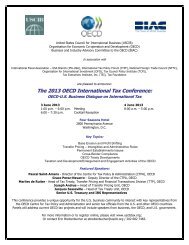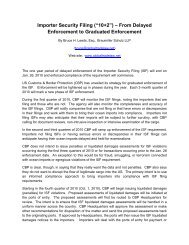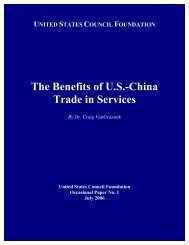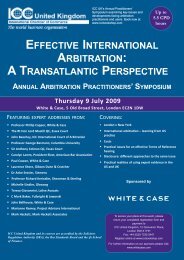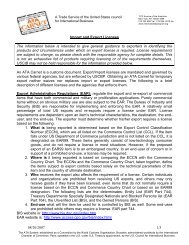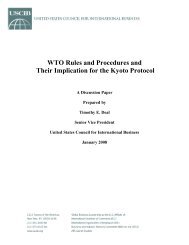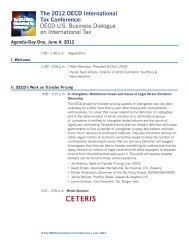Association Letter - U.S. Council for International Business
Association Letter - U.S. Council for International Business
Association Letter - U.S. Council for International Business
You also want an ePaper? Increase the reach of your titles
YUMPU automatically turns print PDFs into web optimized ePapers that Google loves.
March 29, 2012<br />
Dr. Manmohan Singh<br />
Honorable Prime Minister of India<br />
South Block, Raisina Hill<br />
New Delhi 110011<br />
Dear Sir,<br />
Re: Finance Bill 2012<br />
We are writing to express deep concerns about many of the tax provisions proposed in<br />
the Finance Bill 2012. We are independent trade associations, described in the attached<br />
statements, that together count more than 250,000 companies as members. Our member<br />
companies are engaged in a wide spectrum of industries throughout the world and based in<br />
many different countries, but they share a number of serious concerns about proposals<br />
advanced in the Finance Bill.<br />
If enacted, these proposals will significantly alter the Indian taxation of our member<br />
companies, with retroactive effect extending back <strong>for</strong> as much as half a century, and reverse<br />
many decided cases. Some of our member companies had already begun reevaluating their<br />
investments in India due to increasing levels of controversy and uncertainty regarding<br />
taxation in recent years. The sudden and unprecedented move in the Bill has undermined<br />
confidence in the policies of the Government of India toward <strong>for</strong>eign investment and taxation<br />
and has called into question the very rule of law, due process, and fair treatment in India.<br />
This is now prompting a widespread reconsideration of the costs and benefits of investing in<br />
India.<br />
Every nation has a sovereign right to legislate, but these proposals are disturbing to<br />
investors from India’s trading partners in several major respects. Their policy direction is<br />
inconsistent with prevailing international norms, which, together with India’s current<br />
difficulties in resolving international tax disputes, creates an intolerable risk of double<br />
taxation. Their unfettered retroactivity also departs significantly from the practice followed<br />
in other countries, which prohibit or carefully limit the use of retroactive tax legislation.<br />
Their disregard <strong>for</strong> the judiciary is particularly striking when compared with the practice of<br />
other countries, which respect their court decisions and the principle of res judicata. The<br />
proposals also create serious uncertainty about whether India intends to take unilateral action<br />
to upset the balance of its existing treaty obligations, as they authorize the Central Board of<br />
Direct Taxation to define many terms used in tax treaties, with effect from the date on which<br />
each treaty entered into <strong>for</strong>ce. Together, these proposals make it impossible <strong>for</strong> companies to<br />
predict the costs and risks of doing business in India or to have confidence that their results in<br />
past years will stand.<br />
Other provisions of the Bill would protect the Government of India from having to<br />
return taxes previously collected as payments and deposits even if required to comply with<br />
court decisions, and would specifically grant the tax department powers to demand and<br />
collect tax from taxpayers notwithstanding court decisions to the contrary. This appears to<br />
permit revenue authorities to act unchecked by the judiciary and must be addressed.<br />
Although presented as clarifications, these changes are seen as in clear reaction and<br />
contradiction to a long series of recent rulings and judgements rendered by Indian tribunals,
Honorable Prime Minister Manmohan Singh<br />
March 29, 2012<br />
Page 2<br />
High Courts and the Supreme Court of India, and they would likewise affect many currently<br />
pending cases and audits. The most prominent of the judgements that the proposals appear<br />
designed to reverse is the very recent Supreme Court ruling in the Vodafone case, holding<br />
that it is a well-established principle of Indian law that an overseas transaction cannot be<br />
taxed in India even if it has the indirect effect of changing control of a company in India. The<br />
Bill also would expand the definition of ‘royalty’ retroactively to 1976 to include, among<br />
other things, consideration received <strong>for</strong> computer software and <strong>for</strong> transmission by satellite,<br />
cable, optic fibre or similar technology. This provision appears designed to nullify a number<br />
of recent rulings and court decisions, including those in cases involving Asia Satellite<br />
Telecommunications, Ericsson, Factset Research Systems, Infosys Technologies, Intelsat,<br />
ISRO Satellite Centre, Lucent Technologies, Motorola, and TV Today Network. These are<br />
only a few of some two dozen retroactive provisions in the Bill. If tax law changes are<br />
made, they should not apply retroactively. Past court decisions must stand despite<br />
subsequent legislation.<br />
There appears to be an assumption, often expressed by Indian tax authorities, that<br />
India’s ability to attract <strong>for</strong>eign investment is not affected by its taxation policies and<br />
practices. This simply is not the case, especially as other countries adopt tax re<strong>for</strong>ms and<br />
trade and regulatory measures to encourage <strong>for</strong>eign direct investment. India will lose<br />
significant ground as a destination <strong>for</strong> international investment if it fails to align itself with<br />
policy and practice around the world and restore confidence in the relevance of the judiciary.<br />
Respectfully submitted,<br />
<strong>Business</strong> Roundtable<br />
Canadian Manufacturers & Exporters<br />
Capital Markets Tax Committee of Asia<br />
Confederation of British Industry<br />
Japan Foreign Trade <strong>Council</strong>, Inc.<br />
National Foreign Trade <strong>Council</strong>, Inc.<br />
United States <strong>Council</strong> <strong>for</strong> <strong>International</strong> <strong>Business</strong><br />
cc:<br />
Shri Pranab Mukherjee<br />
Honorable Minister of Finance<br />
Ministry of Finance<br />
North Block<br />
New Delhi – 110001
Honorable Prime Minister Manmohan Singh<br />
March 29, 2012<br />
Page 3<br />
Shri Salman Khurshid<br />
Honourable Minister <strong>for</strong> Law & Justice<br />
Ministry of Law and Justice<br />
A-Wing, 4th Floor, Shastri Bhawan<br />
New Delhi 110 001<br />
Shri Anand Sharma<br />
Honorable Minister of Commerce & Industry<br />
Ministry of Commerce & Industry<br />
Udyog Bhawan<br />
New Delhi 110011
300 New Jersey Avenue, NW Telephone 202.872.1260<br />
Suite 800 Facsimile 202.466.3509<br />
Washington, DC 20001<br />
Website brt.org<br />
March 30, 2012<br />
W. James McNerney, Jr.<br />
The Boeing Company<br />
Chairman<br />
David M. Cote<br />
Honeywell <strong>International</strong>, Inc.<br />
Vice Chairman<br />
Andrew N. Liveris<br />
The Dow Chemical Company<br />
Vice Chairman<br />
Robert A. McDonald<br />
The Procter & Gamble<br />
Company<br />
Vice Chairman<br />
John Engler<br />
President<br />
Tita Freeman<br />
Senior Vice President<br />
<strong>Business</strong> Roundtable (BRT), the association of chief executive officers of<br />
leading U.S. companies, represents member companies with over $6 trillion<br />
in annual revenues and more than 14 million employees. BRT member<br />
companies comprise nearly a third of the total value of the U.S. stock market<br />
and invest more than $150 billion annually in research and development --<br />
nearly half of all private U.S. R&D spending. Our companies pay $163 billion<br />
in dividends to shareholders and generate an estimated $420 billion in sales<br />
<strong>for</strong> small and medium-sized businesses annually.<br />
The <strong>Business</strong> Roundtable shares the concerns regarding the Finance Bill 2012<br />
tax proposals discussed in the attached letter and urges that those proposals<br />
be reconsidered.<br />
Sincerely,<br />
LeAnne Redick Wilson<br />
Senior Vice President<br />
John Engler
March 30, 2012<br />
Canadian Manufacturers & Exporters (CME) is Canada's largest trade and industry<br />
association, and the voice of manufacturing and global business in Canada.<br />
Since 1871, we have made a difference <strong>for</strong> Canada's manufacturing and exporting<br />
communities. Fighting <strong>for</strong> their future. Saving them money. Helping them grow.<br />
The association represents more than 10,000 leading companies nationwide. More than 85 per<br />
cent of CME's members are small and medium-sized enterprises. As Canada's leading<br />
business network, CME - through various initiatives including the establishment of the<br />
Canadian Manufacturing Coalition - touches more than 100,000 companies from coast to<br />
coast, engaged in manufacturing, global business and service-related industries.<br />
CME's membership network accounts <strong>for</strong> an estimated 82 per cent of Canadian manufacturing<br />
production and 90 per cent of goods and services exports.<br />
CME shares the concerns regarding the Finance Bill 2012 tax proposals discussed in the<br />
attached letter and urges that those proposals be reconsidered.<br />
Sincerely,<br />
Jean Michel Laurin<br />
Vice President, Global <strong>Business</strong> Policy<br />
1 Nicholas Street, Suite 1500/1 rue Nicholas, bureau 1500, Ottawa ON K1N 7B7<br />
T 613-238-8888 F 613-563-9218 www.cme-mec.ca
30 March 2012<br />
Dear Sirs<br />
The CBI – Confederation of British Industry - is the UK’s leading business organisation, speaking <strong>for</strong> some<br />
240,000 businesses that together employ around a third of the private sector work<strong>for</strong>ce. With offices<br />
across the UK as well as representation in Brussels, Washington, Beijing and Delhi, the CBI co-ordinates the<br />
voice of British business around the world.<br />
The CBI shares the concerns regarding the Finance Bill 2012 tax proposals discussed in the attached letter<br />
and urges that those proposals be reconsidered.<br />
Yours sincerely<br />
John Cridland CBE<br />
Director-General<br />
John Cridland CBE Director-General<br />
DL: +44 (0)20 7395 8005 DF: +44 (0)20 7836 0645 E: john.cridland@cbi.org.uk<br />
CBI Centre Point 103 New Ox<strong>for</strong>d Street London WC1A 1DU<br />
T: +44 (0)20 7379 7400 F: +44 (0)20 7240 1578 W: www.cbi.org.uk<br />
Director-General: John Cridland CBE President: Sir Roger Carr<br />
Registered No: RC000139 (England and Wales) Registered Office: CBI Centre Point 103 New Ox<strong>for</strong>d Street London WC1A 1DU
NATIONAL FOREIGN TRADE COUNCIL, INC.<br />
1625 K STREET, NW, WASHINGTON, DC 20006-1604<br />
TEL: (202) 887-0278 FAX: (202) 452-8160<br />
March 30, 2012<br />
The NFTC, organized in 1914, is an association of some 250 U.S. business enterprises engaged<br />
in all aspects of international trade and investment. Our membership covers the full spectrum<br />
of industrial, commercial, financial and service activities. The NFTC there<strong>for</strong>e seeks to foster a<br />
level playing field in the international business arena by eliminating major tax inequities in the<br />
treatment of U.S. companies operating abroad. To achieve this goal, American businesses must<br />
be able to participate fully in business activities throughout the world, through the export of<br />
goods, services, technology, and entertainment and through direct investment in facilities<br />
abroad. Foreign trade is fundamental to economic growth.<br />
The NFTC shares the concerns regarding the Finance Bill 2012 tax proposals discussed in the<br />
attached letter and urges that those proposals be reconsidered.<br />
Sincerely yours,<br />
William Reinsch<br />
President<br />
Advancing Global Commerce <strong>for</strong> Nearly A Century<br />
www.nftc.org
March 29, 2012<br />
March 30, 2012<br />
Founded in 1945, the U.S. <strong>Council</strong> <strong>for</strong> <strong>International</strong> <strong>Business</strong> (USCIB) is an international<br />
business association whose membership consists of top U.S.-based global companies and<br />
professional services firms from every sector of our economy, and with operations in every<br />
region of the world. USCIB promotes open markets, competitiveness and innovation,<br />
sustainable development and corporate responsibility, supported by international engagement<br />
and prudent regulation. With a unique global advocacy network encompassing the <strong>International</strong><br />
Chamber of Commerce, the <strong>International</strong> Organization of Employers and the <strong>Business</strong> and<br />
Industry Advisory Committee to the OECD, USCIB provides business views to policy makers<br />
and regulatory authorities worldwide, and works to facilitate international trade and investment.<br />
USCIB shares the concerns regarding the Finance Bill 2012 tax proposals discussed in the<br />
attached letter and urges that those proposals be reconsidered.<br />
Sincerely,<br />
Peter M. Robinson<br />
President and CEO



